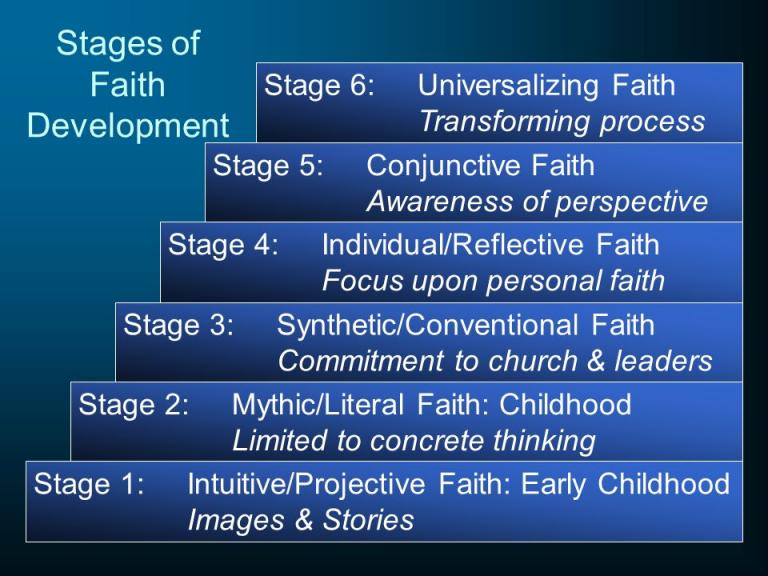Stages of Faith
Age 4 -8 Early Faith - Intuitive-Projective faith (Family)
|
The main influence on a child of this age is their family. At this time the child learns to trust and this affects the later capacity of a child to trust in God. Children imitate their parents and others and learn through observing actions and language. Faith and values are learned in a docile way from parents and family. It is the first step in self-awareness and when one absorbs one’s culture’s strong taboos. The advantages of this stage are the birth of imagination and the growing ability to grasp and unify one’s perception of reality.
|
Age 6 -12 Childhood Faith - Mythic-Literal faith (Stories)
|
Faith becomes more social as the child starts to interact more with others beyond the family. They begin to see themselves as belonging to the stories, beliefs and practices of their Church which are often taken literally. The person begins to take on for him - or herself the stories, beliefs and observances that symbolize belonging to his or her community. Beliefs are appropriated with literal interpretations, as are moral rules and attitudes. Symbols are taken as one-dimensional and literal in meaning. Children quickly develop fierce loyalties to the group and to individuals but can face the first challenge to faith e.g. Mass attendance.
|
Age 11 - 18 Young Adulthood - Synthetic-Conventional faith (Tribe)
|
This stage can follow a number of different patterns. It often begins in conformity and unquestioning acceptance of the tradition. Some people remain at this point and fundamentalism becomes a danger. Most adolescents, though, face the challenge of establishing a personal identity, independence and personal autonomy in their development. This carries over into faith development and they begin searching, challenging religious values, and are more influenced by the peer group, mass media and society in general. These can become the symbols and objects in an unshakable faith in the trappings of the peer group and the media. Some adolescents reject religious practice for a time but will continue to feel a sense of affiliation. Some pass through this stage with little or no upheaval while for others it is a stormy transition.
|
Age 18+ Adult Personal - Individuative-Reflective faith (One Way) |
Many never make the transition to this stage which involves personal commitment to God and is chosen. This stage is marked by a double development. The self, previously sustained in its identity and faith compositions by an interpersonal circle of significant others, now claims an identity no longer defined by the composite of one's roles or meanings to others. It is experienced as the emergence of self and of one’s "world view." Self (identity) and outlook (world view) are differentiated from those of others and become acknowledged factors in the reactions, interpretations and judgments one makes on the actions of the self and others. It expresses its intuitions of coherence in an ultimate environment in terms of an explicit system of meanings. Stage 4 typically translates symbols into conceptual meanings. This is a "demythologizing" stage. It involves critical reflections on areas of apparent tension and choosing one or the other:
|
Age 30+ Community Faith - Conjunctive faith (Many Ways)
|
This stage usually follows a crisis of faith which rarely occurs before a person is well into their thirties and more often older (if it occurs at all). The individual comes to terms with the tensions and no longer needs to choose one way or another and accepts the diversity of faith stances. The individual is able to cope with risk and uncertainty and be interdependent with the community. Here there must also be a new reclaiming and reworking of one's past. There must be an opening to the voices of one's "deeper self." Importantly, this involves a critical recognition of one's social unconscious-the myths, ideal images and prejudices built deeply into the self-system by virtue of one's nurture within a particular social class, religious tradition, ethnic group or the like.
|
Alive to paradox and the truth in apparent contradictions, this stage
strives to unify opposites in mind and experience. It generates and maintains
vulnerability to the strange truths of those who are "other." Ready
for closeness to that which is different and threatening to self and outlook
(including new depths of experience in spirituality and religious revelation),
this stage's commitment to justice is freed from the confines of tribe, class,
religious community or nation. And with the seriousness that can arise when
life is more than half over, this stage is ready to spend and be spent for the
cause of conserving and cultivating the possibility of others' generating
identity and meaning.
|
Universal Faith
|
The person becomes a transforming presence and their community is inclusive. The person at this stage of faith feels a oneness with others and is selfless in their concern for others. Universalizers are often more honored and revered after death than during their lives. The rare persons who may be described by this stage have a special grace that makes them seem more lucid, more simple, and yet somehow more fully human than the rest of us. Their community is universal in extent. Particularities are cherished because they are vessels of the universal, and thereby valuable apart from any utilitarian considerations. Life is both loved and held to loosely. Such persons are ready for fellowship with persons at any of the other stages and from any other faith tradition. Few people develop to this stage. Examples usually given include Pope John XXIII, St. Francis of Assisi, Gandhi, Martin Luther King, Archbishop Oscar Romero. They often die in the name of their God and their lives mirror what they believe. They are a simple loving presence to others.
|





